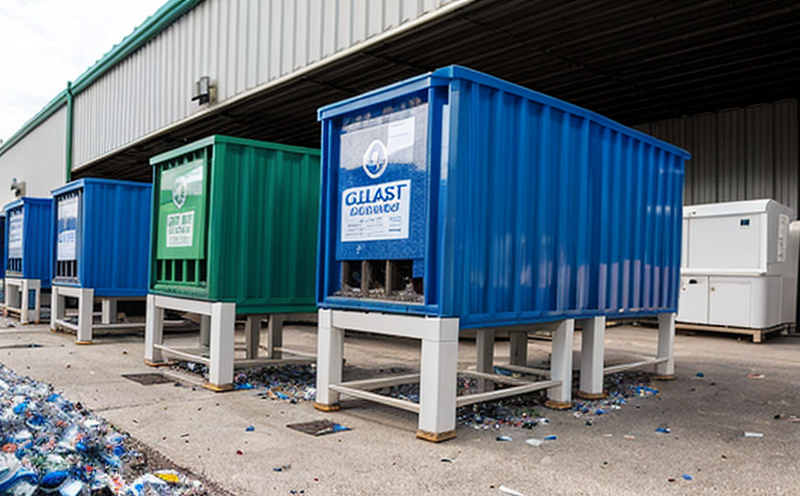EN 12905 Ceramic Waste Density Determination
The determination of ceramic waste density is a critical step in understanding the physical properties and behavior of recycled ceramics under various conditions. This test, as defined by EN 12905:2007, provides essential data for quality control, waste management, and recycling processes in the ceramic industry.
The process involves measuring the density of crushed or ground ceramic waste to ensure that it meets specified standards. This information is vital for optimizing recycling processes, ensuring product consistency, and meeting environmental compliance requirements. The test helps determine whether recycled ceramics can be used in a wide range of applications, from construction materials to industrial products.
The specimen preparation for this test involves crushing the ceramic waste into particles that are uniform in size and shape. This step ensures accurate density measurements by eliminating variables introduced by non-uniform particle distribution. The crushed specimens are then subjected to specific conditions that simulate real-world recycling processes, such as temperature and pressure, to assess their stability.
The instrumentation used for this test includes a precision balance capable of measuring small masses with high accuracy. The equipment must also be capable of handling the varying sizes and shapes of ceramic particles. The process typically involves drying the specimens at controlled temperatures to eliminate moisture content that could affect density readings. This ensures that the measured density reflects the intrinsic properties of the ceramic material.
The acceptance criteria for this test are based on established international standards, ensuring consistency across different laboratories and regions. Compliance with these standards is crucial for industries involved in waste management and recycling, as it provides a reliable basis for decision-making regarding the use of recycled ceramics.
- Accuracy: Precision balances used for measuring density should have an accuracy within ±0.1%.
- Moisture Content: Specimens must be dried to constant weight before testing, ensuring moisture content does not exceed 0.5%.
- Temperature Control: Testing must be conducted under controlled environmental conditions, typically at room temperature (23 ± 2°C).
This test is essential for industries that rely on recycled materials, as it provides a standardized method for evaluating the quality of ceramic waste. By ensuring consistent and accurate density measurements, this process supports sustainable practices in waste management and recycling.
Why Choose This Test
The EN 12905:2007 ceramic waste density determination test is a cornerstone in the recycling and waste management sectors. It ensures that recycled ceramics meet stringent quality standards, which is critical for maintaining product integrity and environmental compliance.
For quality managers, this test provides valuable data on the consistency of recycled ceramic materials, enabling them to make informed decisions about process improvements and material specifications. For compliance officers, it offers a reliable method for ensuring that waste management practices adhere to international standards.
R&D engineers can use this test to optimize recycling processes and develop new applications for recycled ceramics. By understanding the density of different types of ceramic waste, they can tailor their research to meet specific industry needs. For procurement professionals, it ensures that high-quality materials are sourced from reliable suppliers, reducing risks associated with substandard products.
The test is particularly beneficial in sectors where recycled ceramics are used extensively, such as construction and manufacturing. It helps ensure that the recycled materials are suitable for their intended applications, thereby promoting sustainability and reducing environmental impact.
Quality and Reliability Assurance
- Consistent Results: The use of precision balances ensures consistent density measurements across different batches of ceramic waste. This consistency is crucial for maintaining product quality and reliability in recycling processes.
- Environmental Compliance: Adherence to international standards like EN 12905:2007 guarantees that the test results are reliable and can be trusted by regulatory bodies. This compliance reduces the risk of non-compliance penalties and enhances an organization's reputation for environmental responsibility.
- Sustainable Practices: By ensuring that recycled ceramics meet high quality standards, this test supports sustainable waste management practices. It helps reduce landfill usage and promotes the circular economy by encouraging the reuse of materials.
The reliability of this test is further enhanced by regular calibration of equipment and adherence to standardized procedures. This ensures that the results are accurate and can be consistently reproduced, providing stakeholders with confidence in the quality of recycled ceramics.
Regular audits and internal quality checks also play a crucial role in maintaining the integrity of the testing process. These practices ensure that any deviations from standard procedures are quickly identified and corrected, further enhancing the reliability of the test results.
International Acceptance and Recognition
The EN 12905:2007 standard for ceramic waste density determination is widely recognized and accepted across Europe and beyond. This international recognition ensures that the test results are valid and reliable, regardless of where they are conducted.
The use of this standard facilitates global trade in recycled ceramics by ensuring a common language and set of criteria for quality assessment. This harmonization of standards reduces barriers to entry for businesses operating in multiple markets, promoting fair competition and consistent product quality.
Organizations that adopt the EN 12905:2007 standard demonstrate their commitment to high-quality recycling processes. This commitment can enhance their reputation among customers, investors, and regulatory bodies, fostering trust and long-term business relationships.
The widespread acceptance of this standard also encourages innovation in waste management and recycling technologies. By setting a benchmark for quality, it drives industries to develop more efficient and effective methods for processing ceramic waste, ultimately leading to greater sustainability and reduced environmental impact.





